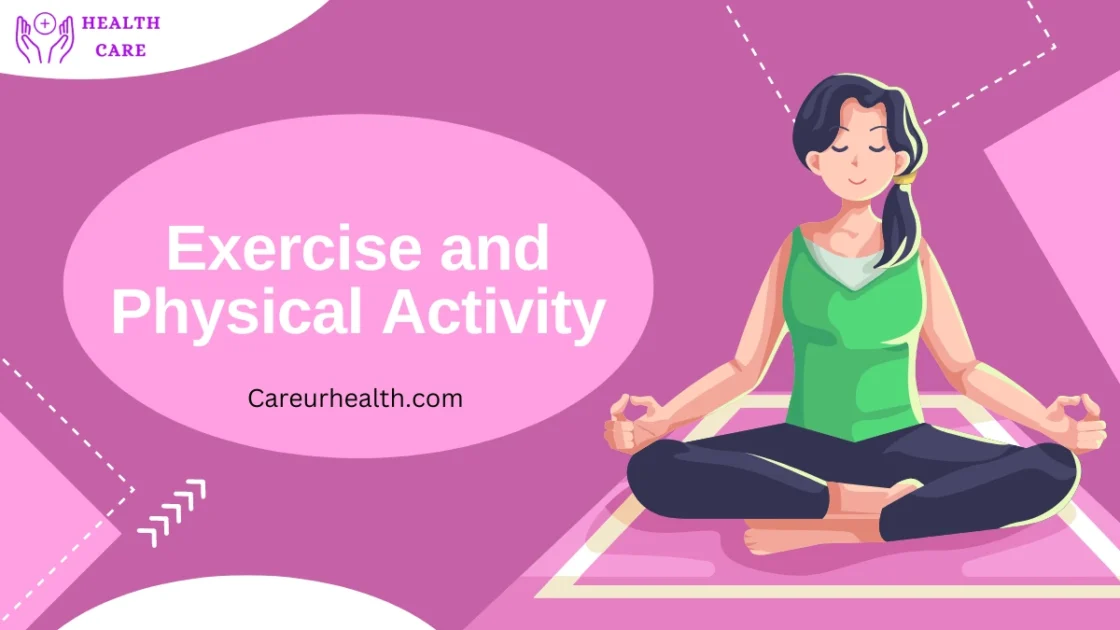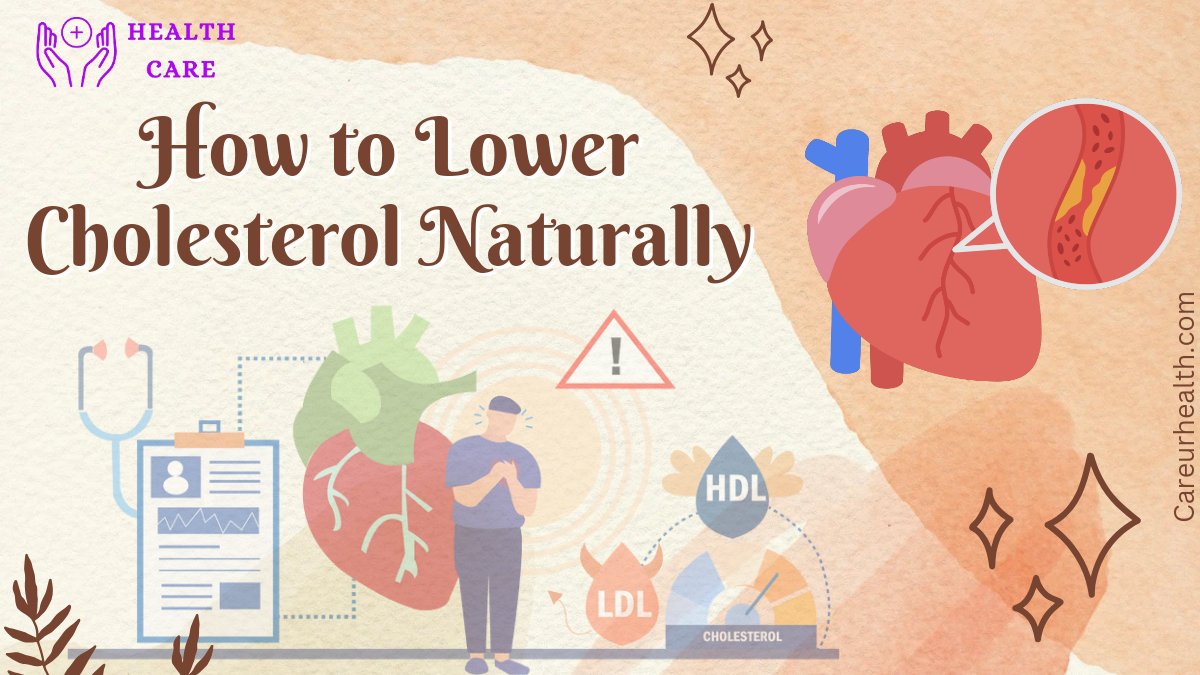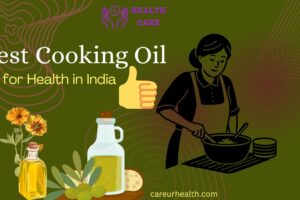Introduction: The Importance of Managing Cholesterol
Cholesterol plays a vital role in the body, but an excessive amount can lead to serious health issues, such as heart disease and stroke.
Managing cholesterol levels naturally involves making lifestyle and dietary changes that can effectively lower LDL (low-density lipoprotein) and increase HDL (high-density lipoprotein).
This guide explores various natural methods to achieve and maintain healthy cholesterol levels.
Understanding Cholesterol Levels
Cholesterol is a fatty substance found in your blood. It’s essential for building cells and producing hormones, but too much can cause problems.
LDL cholesterol is often referred to as “bad” cholesterol because it can build up in the arteries, leading to atherosclerosis.
On the other hand, HDL cholesterol is known as “good” cholesterol because it helps remove excess cholesterol from the blood.
Importance of Natural Methods

While medications can help manage cholesterol, natural methods are often preferred due to their sustainability and lack of side effects.
Implementing lifestyle changes can have a profound impact on cholesterol levels and overall heart health. This approach not only improves cholesterol levels but also promotes general well-being.
Key Takeaways: Natural Ways to Lower Cholesterol
- Dietary Adjustments: Incorporate more fiber and healthy fats into your diet.
- Physical Activity: Regular exercise can help increase HDL and lower LDL cholesterol.
- Weight Management: Maintaining a healthy weight is crucial for cholesterol control.
- Limit Saturated Fats: Reduce intake of saturated and trans fats to lower LDL levels.
- Include Omega-3s: Foods rich in omega-3 fatty acids can improve heart health.
Dietary Adjustments for Cholesterol Management
Increase Fiber Intake
Consuming fiber-rich foods can significantly help in lowering LDL cholesterol. Soluble fiber, found in foods like oats, beans, and apples, binds with cholesterol in the digestive system and helps remove it from the body.
Aim for at least 25-30 grams of fiber daily to support healthy cholesterol levels.
Choose Healthy Fats
Incorporating healthy fats, such as those found in avocados, nuts, and olive oil, can improve cholesterol levels.
Unlike saturated and trans fats, unsaturated fats can help increase HDL cholesterol while reducing LDL cholesterol. Replacing unhealthy fats with these healthier options can have a positive impact on heart health.
Eat More Fruits and Vegetables

Fruits and vegetables are packed with antioxidants, vitamins, and minerals that support heart health.
They also provide essential fiber and can help lower cholesterol levels. Aim to fill half your plate with a variety of colorful fruits and vegetables at each meal to maximize health benefits.
Read more:-Ayurvedic Home Remedies for a Healthy Heart: Nurturing Cardiovascular Wellness Naturally
Limit Sugar and Refined Carbs
Reducing sugar and refined carbohydrates, such as white bread and pastries, can help manage cholesterol levels.
These foods can lead to weight gain and increase triglyceride levels, which negatively affect heart health. Opt for whole grains and natural sweeteners instead.
Incorporate Omega-3 Fatty Acids
Omega-3 fatty acids, found in fatty fish like salmon and flaxseeds, can help improve heart health.
These healthy fats reduce inflammation and can help lower LDL cholesterol while increasing HDL cholesterol. Including omega-3-rich foods in your diet a few times a week can be beneficial.
Physical Activity and Its Role
Benefits of Regular Exercise
Engaging in regular physical activity helps improve cholesterol levels and overall cardiovascular health. Exercise can help increase HDL cholesterol while reducing LDL cholesterol and triglycerides.
Aim for at least 150 minutes of moderate aerobic exercise, such as brisk walking or cycling, each week.
Introduction: Why Focus on Natural Cholesterol Management?
Managing cholesterol levels is crucial for maintaining cardiovascular health and reducing the risk of heart disease.
While medications are often prescribed, natural methods offer a holistic approach to controlling cholesterol.
By adopting lifestyle and dietary changes, individuals can achieve sustainable improvements in their cholesterol levels without relying solely on pharmaceuticals.
Understanding Cholesterol and Its Impact
Cholesterol is a fatty substance in the blood that’s essential for various bodily functions, but an excessive amount can lead to health problems.
LDL (low-density lipoprotein) cholesterol, known as “bad” cholesterol, can accumulate in the arteries, causing blockages and increasing the risk of heart disease.
HDL (high-density lipoprotein) cholesterol, or “good” cholesterol, helps remove excess cholesterol from the blood, thus protecting the heart.
Benefits of Natural Approaches
Natural methods for managing cholesterol are often preferred due to their safety and long-term benefits.
They focus on lifestyle changes that not only improve cholesterol levels but also enhance overall well-being. These approaches are generally free from the side effects associated with some medications and promote a balanced lifestyle.
Dietary Changes to Lower Cholesterol
Emphasize High-Fiber Foods
Increasing fiber intake is one of the most effective ways to lower LDL cholesterol levels. Foods high in soluble fiber, such as oats, beans, and apples, help bind cholesterol in the digestive tract and facilitate its removal from the body.
Incorporating these foods into your diet can lead to significant improvements in cholesterol levels over time. Discover how to lower cholesterol naturally through lifestyle changes.
Opt for Healthy Fats
Replacing unhealthy fats with healthier alternatives is crucial for managing cholesterol. Unsaturated fats, found in foods like avocados, nuts, and olive oil, can help raise HDL cholesterol while lowering LDL cholesterol.
Avoiding saturated and trans fats, commonly found in processed foods, is essential for maintaining a healthy balance. Discover how to lower cholesterol naturally through lifestyle changes.
Incorporate Omega-3 Fatty Acids
Omega-3 fatty acids are beneficial for heart health and can help lower cholesterol levels. Discover how to lower cholesterol naturally through lifestyle changes.
These healthy fats, found in fatty fish like salmon, mackerel, and in plant-based sources such as flaxseeds and chia seeds, reduce inflammation and improve cholesterol profiles. Regular consumption of omega-3-rich foods can contribute to overall cardiovascular wellness.
Exercise and Physical Activity

Importance of Regular Exercise
Engaging in regular physical activity is essential for managing cholesterol levels and improving overall heart health. Exercise helps increase HDL cholesterol while reducing LDL cholesterol and triglycerides.
Aim for at least 150 minutes of moderate-intensity aerobic activity, such as brisk walking or cycling, each week. Discover how to lower cholesterol naturally through lifestyle changes.
Weight Management and Cholesterol
The Role of Weight in Cholesterol Control
Maintaining a healthy weight is essential for managing cholesterol levels. Excess body fat, particularly around the abdomen, can contribute to higher LDL cholesterol and triglycerides.
Effective weight management involves a combination of dietary changes and regular exercise.
Read more:- Optimal Weight Management: Choosing the Best Dry Fruits for Weight Loss
Strategies for Sustainable Weight Loss
Adopting a balanced diet and increasing physical activity are key strategies for sustainable weight loss.
Focus on eating whole, nutrient-dense foods, and avoiding processed items and excessive calories.
Gradual, consistent changes are more effective than extreme diets for achieving lasting results. Discover how to lower cholesterol naturally through lifestyle changes.
Setting and Achieving Weight Goals
Setting realistic weight goals can help you stay focused and motivated. Aim for a gradual weight loss of about 1-2 pounds per week, which is considered safe and effective. Monitor your progress and adjust your approach as needed to reach your goals.
Tracking Progress and Making Adjustments
Tracking your progress is important for managing weight and cholesterol levels. Use tools such as food journals or fitness apps to monitor your intake and activity levels.
Regularly reviewing your progress allows you to make informed adjustments to your weight loss and cholesterol management strategies.
Seeking Professional Support
If you encounter difficulties with weight management or cholesterol control, consider seeking guidance from a healthcare professional or a registered dietitian. They can provide personalized advice and support to help you achieve your health and wellness goals.
Conclusion: Embracing a Holistic Approach to Cholesterol Management
Lowering cholesterol naturally involves a combination of dietary changes, physical activity, and weight management. Discover how to lower cholesterol naturally through lifestyle changes.
By focusing on these lifestyle factors, individuals can achieve significant improvements in cholesterol levels and overall heart health. Embracing these natural methods promotes a balanced and sustainable approach to managing cholesterol, leading to long-term health benefits.
Types of Effective Exercise
Both aerobic and strength training exercises are beneficial for managing cholesterol. Aerobic activities like running, swimming, or dancing help improve heart health and circulation. Discover how to lower cholesterol naturally through lifestyle changes.
Strength training exercises, such as weightlifting, can help build muscle and support metabolism.
Incorporating Exercise into Daily Life
Finding ways to integrate exercise into your daily routine can make it more manageable. Consider taking the stairs instead of the elevator, going for a walk during your lunch break, or participating in a group fitness class. The key is to choose activities you enjoy and can sustain long-term.
Setting Realistic Goals
Setting achievable fitness goals can help keep you motivated and on track. Start with small, manageable objectives and gradually increase the intensity and duration of your workouts.
Tracking your progress and celebrating your achievements can boost motivation and adherence to your exercise routine. Discover how to lower cholesterol naturally through lifestyle changes.
Staying Consistent
Consistency is crucial for long-term success in managing cholesterol through exercise. Establishing a regular routine and making physical activity a part of your daily life can lead to lasting health benefits. Find ways to stay motivated and overcome barriers to ensure you stick with your exercise plan.
Weight Management and Cholesterol
Importance of Maintaining a Healthy Weight
Achieving and maintaining a healthy weight is essential for managing cholesterol levels. Excess body fat, particularly around the abdomen, can negatively affect cholesterol and triglyceride levels. Weight loss can lead to significant improvements in both LDL and HDL cholesterol levels. Discover how to lower cholesterol naturally through lifestyle changes.
Read more:-
Strategies for Effective Weight Loss
Adopting a balanced diet and increasing physical activity are key components of effective weight loss. Focus on a diet rich in whole foods, lean proteins, and healthy fats while minimizing processed foods and sugary beverages. Combining dietary changes with regular exercise can support sustainable weight loss.
Setting Realistic Weight Goals
Setting realistic and achievable weight goals can help maintain motivation and prevent frustration. Aim for a gradual weight loss of about 1-2 pounds per week, which is considered safe and effective. Small, consistent changes in diet and exercise can lead to long-term success.
Discover how to lower cholesterol naturally through lifestyle changes.
Tracking Progress
Keeping track of your progress can help you stay accountable and make necessary adjustments to your weight loss plan. Use tools such as food journals or fitness apps to monitor your intake and activity levels. Regularly reviewing your progress can help you stay focused and motivated.
Seeking Professional Guidance
If you’re struggling with weight management or have specific health concerns, consider seeking guidance from a healthcare professional or a registered dietitian.
They can provide personalized advice and support tailored to your individual needs and goals. Discover how to lower cholesterol naturally through lifestyle changes.
Conclusion: Embracing Natural Methods for Cholesterol Management
Lowering cholesterol naturally involves a holistic approach that combines dietary changes, regular physical activity, and effective weight management.
By making healthy lifestyle choices and incorporating these strategies, you can achieve and maintain optimal cholesterol levels. Discover how to lower cholesterol naturally through lifestyle changes.
Embracing these natural methods not only supports heart health but also enhances your overall well-being.
FAQs About Lowering Cholesterol Naturally
- What dietary changes can help lower cholesterol?
Increasing fiber intake, choosing healthy fats, and eating more fruits and vegetables can help lower cholesterol levels. Reducing sugar and refined carbs is also beneficial.
- How much exercise is needed to improve cholesterol levels?
Aim for at least 150 minutes of moderate aerobic exercise per week. Incorporating strength training and staying active throughout the day can also be helpful.
- How does weight management affect cholesterol levels?
Maintaining a healthy weight can improve cholesterol levels by reducing excess body fat, particularly around the abdomen. Effective weight management involves a balanced diet and regular exercise.
- Can omega-3 fatty acids improve cholesterol levels?
Yes, omega-3 fatty acids, found in fatty fish and flaxseeds, can help lower LDL cholesterol and increase HDL cholesterol. Find out how to lower cholesterol naturally without medication. Including these foods in your diet can support heart health.
- What if I need additional help managing cholesterol?
If natural methods are not enough, consult a healthcare professional for personalized advice and treatment options. They can provide additional guidance and support for managing cholesterol effectively.
The Yoga Institute










